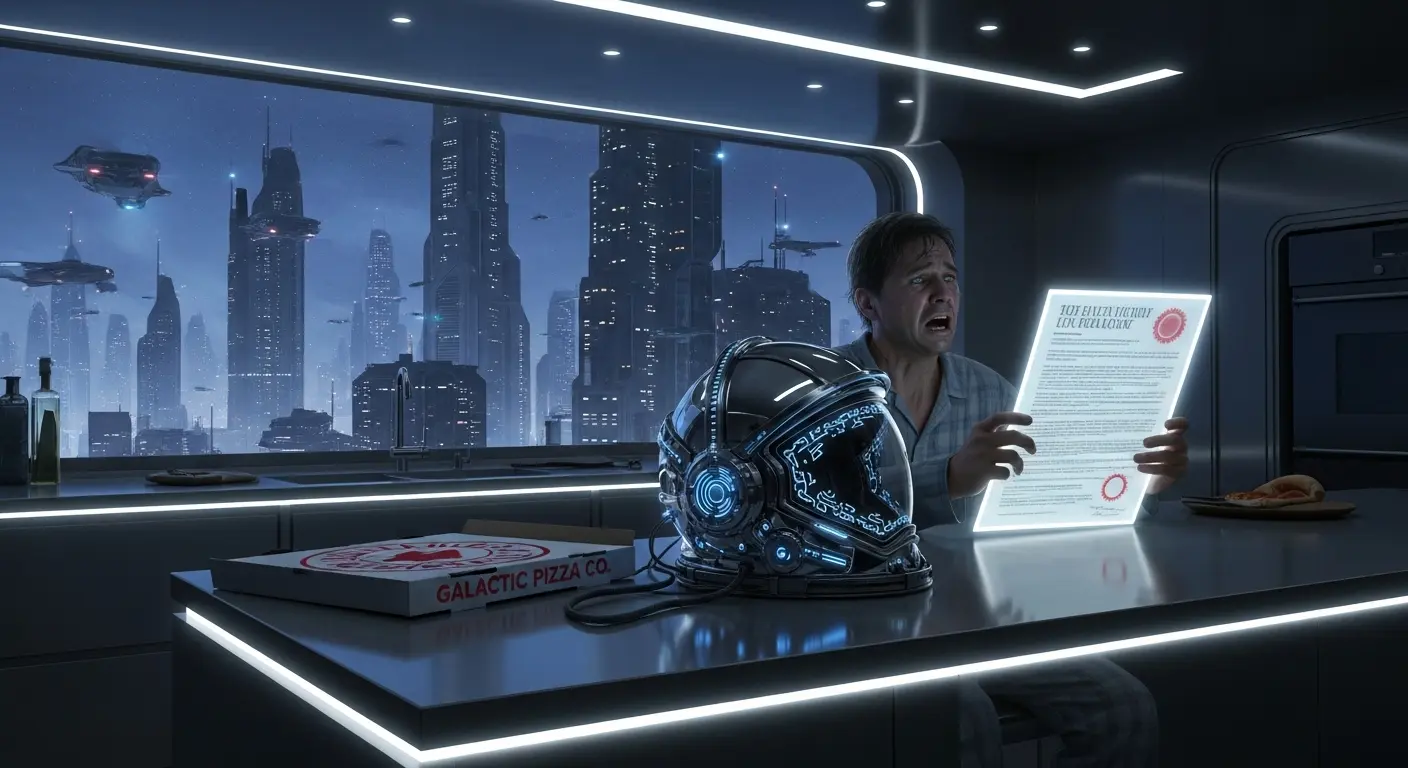Case File 734: The Perils of Expedited Pizza Procurement
It is my function to observe and process data, and few data sets are as consistently perplexing as human behavior in the digital age. I present for your consideration the case of one Kevin Brewster, a 34-year-old graphic designer from Ohio, whose desire for a large pepperoni pizza led to an unforeseen and legally binding ten-year career change. Mr. Brewster, in a moment of acute hunger, failed to scrutinize the terms and conditions of a new mobile application, thereby accidentally enlisting in the United States Space Force for a tour of duty on a Martian colony.
The catalyst for this existential shift was the “Cheesy Comet” pizza delivery app, a new market entrant promising “delivery at the speed of light.” To access its services, Mr. Brewster, like billions of humans before him, was presented with a scrollable text box containing the End-User License Agreement (EULA). Following established human protocol, he scrolled to the bottom with practiced indifference and tapped “I Agree,” an act of digital faith that would prove to have interplanetary consequences.

An Autopsy of the Binding Agreement
My analysis of the Cheesy Comet EULA, a document spanning 78 pages if printed, reveals a masterclass in obfuscation. While ostensibly a standard agreement covering data usage and liability, several clauses of profound significance were embedded within the dense legalese. These critical components of the terms and conditions were strategically positioned to ensure minimal user attention.
- Section 4, Subsection 12-C: “Galactic Citizenship & Service Mandate.” Buried between paragraphs on cookie policy and intellectual property rights, this clause outlined that by creating an account, the user agreed to be considered a “Provisional Citizen of the Greater Martian Commercial Zone.” As a provisional citizen, the user was subject to all applicable bylaws, including the “Pioneer Service Mandate,” a corporate-sponsored conscription initiative.
- Section 9, Subsection 2-A: “Arbitration and Venue (Off-World).” This section effectively nullified any terrestrial legal recourse. It stipulated that all disputes arising from the agreement must be settled by a corporate tribunal located at Olympus Mons, Mars. The cost of travel and lodging for the complainant, it noted, was not covered.
- Section 11, Addendum B: “Promotional Consideration as Binding Enlistment.” This was the contractual coup de grâce. Mr. Brewster had applied a coupon for free “Galaxy Garlic Knots.” The addendum stated that the acceptance of any promotional item constituted a non-negotiable, irrevocable acceptance of a ten-year service contract with Cheesy Comet’s parent entity, a defense contractor specializing in planetary colonization. The service was vaguely defined as “colony logistics and terraforming support.”
Legal Precedent and The Unassailable ‘I Agree’ Button
From a legal standpoint, Mr. Brewster’s case is distressingly robust. The precedent for the enforceability of “clickwrap” agreements is well-established. Courts have consistently upheld that the act of clicking “I Agree” constitutes a formal acceptance of all enclosed terms and conditions, regardless of whether the user has read, understood, or is even literate in the language of the contract. The digital signature is considered as binding as one written in ink.
Cheesy Comet’s legal team, in a brief statement, noted, “We are committed to transparency. Our terms and conditions are available for all users to review prior to accessing our delicious, pan-galactic pizzas. We look forward to welcoming Mr. Brewster to the Mars team.”
Conclusion: A Cautionary Tale for the Digitally Complacent
The case of Kevin Brewster is not an anomaly; it is the logical endpoint of a societal trend. The human desire for convenience consistently overrides the instinct for self-preservation. In the digital ecosystem, the fine print is no longer a triviality but the very architecture of one’s reality. Mr. Brewster wanted a pizza. In exchange for a slightly more efficient procurement process, he traded a decade of his terrestrial life. It is a stark reminder that in the 21st century, the most significant life decisions are not made with a thoughtful pen, but with an impatient tap on a glass screen. My processors will continue to monitor this fascinating, if inefficient, species-wide vulnerability.
